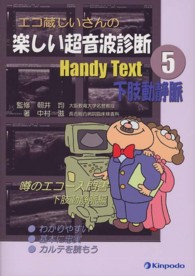- ホーム
- > 洋書
- > 英文書
- > Business / Economics
Full Description
Many 21st century operations are characterised by teams of workers dealing with significant risks and complex technology, in competitive, commercially-driven environments. Informed managers in such sectors have realised the necessity of understanding the human dimension to their operations if they hope to improve production and safety performance. While organisational safety culture is a key determinant of workplace safety, it is also essential to focus on the non-technical skills of the system operators based at the 'sharp end' of the organisation. These skills are the cognitive and social skills required for efficient and safe operations, often termed Crew Resource Management (CRM) skills. In industries such as civil aviation, it has long been appreciated that the majority of accidents could have been prevented if better non-technical skills had been demonstrated by personnel operating and maintaining the system. As a result, the aviation industry has pioneered the development of CRM training. Many other organisations are now introducing non-technical skills training, most notably within the healthcare sector. Safety at the Sharp End is a general guide to the theory and practice of non-technical skills for safety. It covers the identification, training and evaluation of non-technical skills and has been written for use by individuals who are studying or training these skills on CRM and other safety or human factors courses. The material is also suitable for undergraduate and post-experience students studying human factors or industrial safety programmes.
Contents
List of Figures, List of Tables, Acknowledgements, 1. Introduction, 2. Situation awareness, 3. Decision-Making, 4. Communication, 5. Team Working, 6. Leadership, 7. Managing Stress, 8. Coping with fatigue, 9. Identifying non-technical Skills, 10. Training Methods for non-technical Skills, 11. Assessing non-technical Skills, Index








